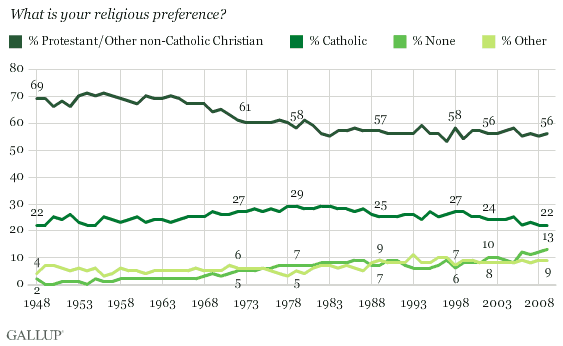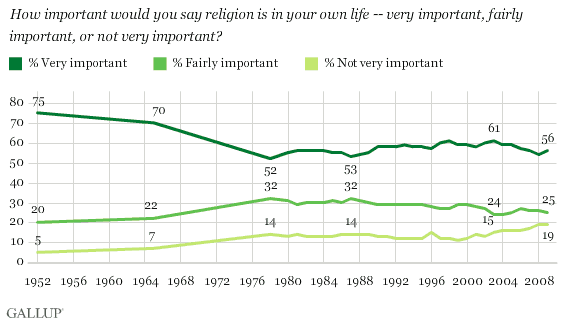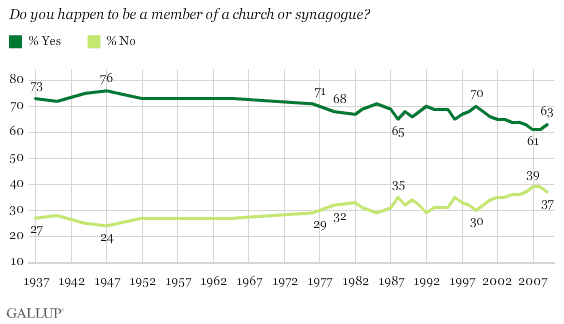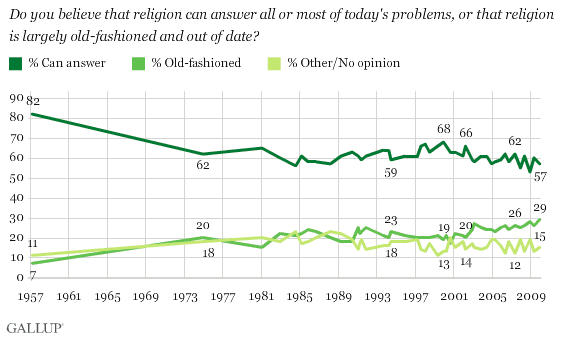PRINCETON, NJ -- This Christmas season, 78% of Americans identify with some form of Christian religion, a proportion that has been declining in recent decades. The major reason for this decline has been an increase in the percentage of Americans claiming no religious identity, now at 13% of all adults.

The trend results are based on annual averages of Gallup's religious identity data in America that stretch back over 60 years. One of the most significant trends documented during this period is the substantial increase in the percentage of American adults who don't identify with any specific religion. In 1948, only 2% of Americans did not identify with a religion. That percentage began to rise in the late 1960s and early 1970s. Eleven years ago, in 1998, 6% of Americans did not identify with a religion, a number that rose to 10% by 2002. This year's average of 13% of Americans who claim no religious identity is the highest in Gallup records.
The percentage of Americans who identify as Catholic, Protestant, or some other non-Catholic Christian faith has been concomitantly decreasing over the years. This suggests that one of the major patterns of religious transition in America in recent decades has been the shift from identification as Christian to the status of having no specific religious identification.
In 1948, 91% of Americans identified with a Christian faith. Twenty years ago, in 1989, 82% of Americans identified as Christian. Ten years ago, it was 84%. This year, as noted, 78% of all American adults identify with a Christian faith.
There has also been a slight increase in the percentage of Americans who identify with a religion that is not specifically classified as Christian. Sixty years ago, for example, 4% of Americans identified with a non-Christian religion. By 1989, 9% of Americans were in this non-Christian religion category, the same percentage as today.
Personal Importance of Religion
Does the decrease in religious identity signify that religion is losing its importance for Americans? There was a substantial drop in the percentage of Americans who said religion was "very important" in their lives between the 1960s and the 1970s -- from 70% in 1965 to 52% by 1978 -- but in recent decades, this "very important" percentage has remained relatively steady. The overall figure today -- 56% -- is slightly higher than it was 31 years ago.

"The percentage of Americans who in theory could celebrate Christmas this week as a specific component of their religious faith is down significantly from where it was 50 or 60 years ago."
There has been a slight tendency over the years for Americans to shift from a "fairly important" category to the "not very important" category in answer to this religious importance question. The percentage saying religion is not very important in their lives was routinely in the 12% to 15% range from 1978 through the early years of this decade. In more recent years, this percentage has drifted slightly upward, and is at 19% this year.
Church Membership
As would be expected, given the drop in the percentage of Americans who have a religious identity, there has been a similar drop in the percentage of Americans who say they are a member of a church or synagogue.

Gallup first asked this church membership question in 1937, at which time 73% of Americans said they were a member of a religious congregation. That percentage stayed above 70% in occasional Gallup surveys conducted through 1976, and remained in the high 60% range for the most part through the beginning of this decade. In recent years, the church membership percentage has been drifting down, reaching as low as 61% in Gallup's averages for 2007 and 2008. This year's average is 63%.
Is Religion Old-Fashioned and Out of Date?
Gallup has asked Americans over the years whether "religion can answer all or most of today's problems" or whether it "is largely old-fashioned and out of date." The majority of Americans over the last 52 years have chosen the first of these responses.

The biggest change in attitudes on this measure came between Gallup's survey in 1957 -- a very religious decade, based on Gallup indicators -- and the data collected in more recent decades.
The years from 1974 to the present have been marked by significant fluctuations in the answer to this question. Generally speaking, the percentage of Americans saying that religion can answer all or most of today's problems has been in a range between the mid-50s and the mid-60s. The recent decade high point was 68% in a survey conducted 10 years ago, in December 1999. The recent low point was 53% in a survey conducted last December. In two surveys conducted this year, the percentages saying that religion can answer all or most of today's problems were 60% and 57%.
A considerable percentage of Americans over the years, when confronted by the two choices offered by this question, have replied that they can't choose or have another opinion. This year, for example, 13% and 15% of Americans have given one of these answers in Gallup's two surveys that included this question.
Bottom Line
The United States remains a dominantly Christian nation. Almost 8 out of 10 Americans identify with a Christian religion. And the vast majority of those who identify with any religion identify with one that is Christian.
Yet, the percentage of Americans who in theory could celebrate Christmas this week as a specific component of their religious faith is down significantly from where it was 50 or 60 years ago. The most important reason for this shift is straightforward: there has been an increasing percentage of Americans who say they have no specific religious identity.
The fact that fewer Americans say they have a religious identity does not necessarily mean there has been a decrease in overall religiosity in America. It is possible that some proportion of those who don't identify with a specific religion are still personally or spiritually religious.
Although a little more than one out of five Americans do not identify with a Christian faith, the Christmas season has ramifications for a broader segment of society. A Gallup survey conducted last year showed that 93% of all American adults said they celebrated Christmas.
